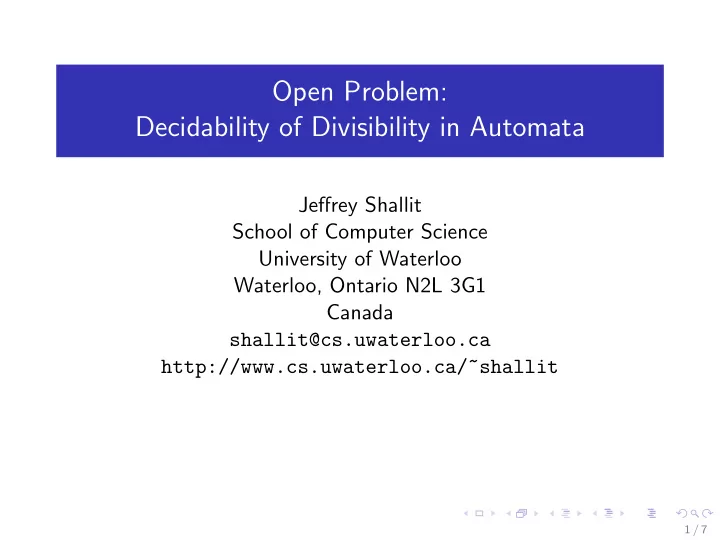

Open Problem: Decidability of Divisibility in Automata Jeffrey Shallit School of Computer Science University of Waterloo Waterloo, Ontario N2L 3G1 Canada shallit@cs.uwaterloo.ca http://www.cs.uwaterloo.ca/~shallit 1 / 7
The model ◮ Σ k = { 0 , 1 , . . . , k − 1 } ◮ Numbers are represented in base k ◮ Numbers represented by words in Σ ∗ k ◮ Canonical representation of n is ( n ) k , without leading zeroes ◮ If w ∈ Σ ∗ k then [ w ] k is the integer represented by w ◮ E.g., 3526 is represented by the string 3526 2 / 7
Representing pairs ◮ Representations of pairs of integers are words over the alphabet Σ k × Σ k ◮ For example, if w = [3 , 0][5 , 0][2 , 4][6 , 1] then [ w ] 10 = (3526,41) . ◮ Canonical representations lack leading [0 , 0]’s 3 / 7
An open question Question: Given an automaton M accepting the base- k representations of a set of pairs S ⊆ N 2 , is there a pair ( p , q ) ∈ S such that p | q ? 4 / 7
What’s known ◮ Tarski: the first-order theory of ( N , + , | ) is undecidable. (Idea: use | to implement multiplication.) ◮ Decidable: given an automaton M accepting the base- k representations of a set of pairs S ⊆ N 2 , does p | q for all ( p , q ) ∈ S ? ◮ The condition p | q for all ( p , q ) ∈ S is very strong, and forces p to be in an easily describable set 5 / 7
A related question ◮ Suppose M is an automaton with n states and ◮ Suppose it accepts the base- k representations of a set S ⊆ N × N of pairs ( p , q ) such that p | q for at least one pair ◮ How large can the smallest q be, in terms of n ? ◮ A simple argument shows q can be doubly-exponential: ◮ Choose a prime p such that 2 is a primitive root, modulo p and S = ( p , 2 n − 1) for n ≥ 1. It is easy to build a DFA of log 2 p + O (1) states accepting ( S ) 2 , but the smallest pair ( p , q ) where p | q has q = 2 p − 1 − 1, and hence is doubly exponentially large in n . 6 / 7
Even worse examples ◮ Take ( p , q ) = (2 j + s , 2 i + r ) where i ≥ i 0 , j ≥ j 0 . ◮ Example: for ( r , s ) = (55 , 113) the smallest solution is ( i , j ) = (685 , 11). ◮ The least i ≥ 6 such that there exists j ≥ 6 with 2 j + 57 | 2 i + 55 seems to be i = 5230932780542371665, j = 70. 7 / 7
Recommend
More recommend